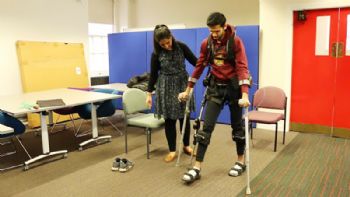
Sheffield University’s Department of Automatic Control and Systems Engineering (ACSE) is leading a collaborative project to develop an exoskeleton that could help people with conditions like multiple sclerosis (MS) to exercise independently.
The Phoenix Exoskeleton is at the centre of a study — being carried out by the University of Sheffield (
www.sheffield.ac.uk), Sheffield Hallam University and the Royal Hallamshire Hospital — to examine how the exoskeleton (or robot suit) could improve physical fitness in people with mobility issues.
The £40,000 year-long study is being funded by he MS Society, which is seeking to reduce issues such as high blood pressure, stroke, obesity and depression in people with MS — by helping them to increase their physical activity.
Susan Kohlhaas, the MS Society’s director of research, said: “Exercise is a proven way for people with MS to slow the build-up of disability, improve their symptoms, and even boost their mood.
"We are proud to be investing in this exciting new project in Sheffield, which could have a huge impact on our community.”
The project, which is due to begin this month, will see 12 volunteers exercise regularly using the Phoenix exoskeleton, with their progress monitored.
Siva Nair and his team at the Royal Hallamshire Hospital are tasked with assessing the performance of the 12 participants.
He said: “Robotics is a natural step forward here. By embracing this technology, we are giving people who can’t walk the chance to exercise like everyone else.
"We understand that it’s not every day you see someone in a robot suit, and society might need to adjust to such a weird and wonderful sight.
"That is why we’re also going to be observing the personal implications of keeping fit in this way.”